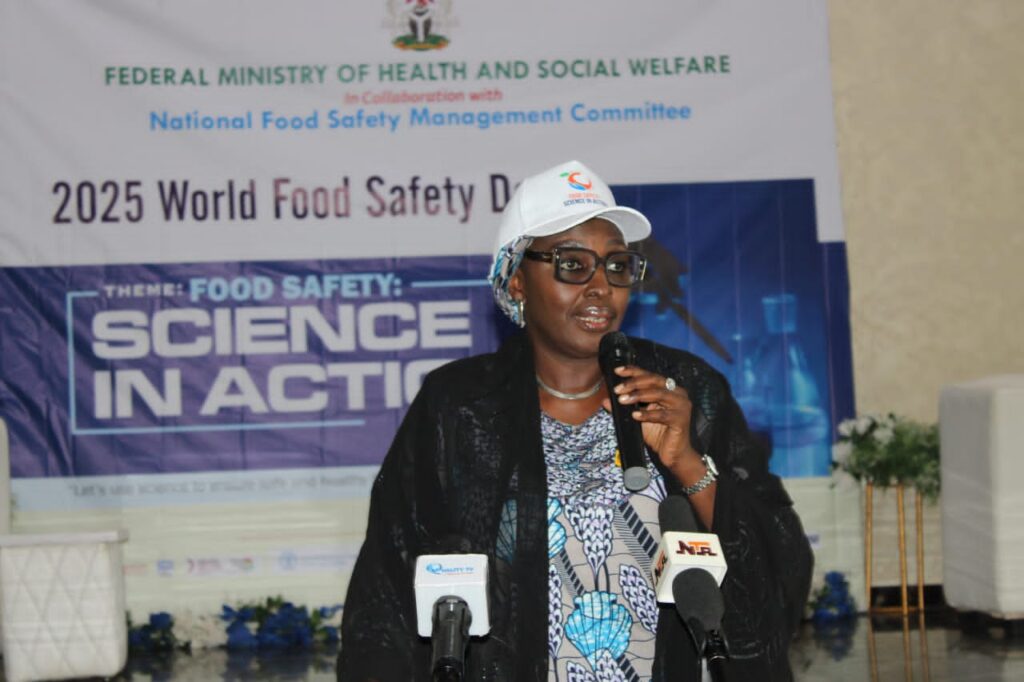From Atiku Sarki, Abuja
The Federal Government has reaffirmed its commitment to transforming Nigeria’s food safety system through a science-driven strategy aimed at safeguarding public health and ensuring safer food across the country.
Speaking at the 2025 World Food Safety Day celebration in Abuja, the Permanent Secretary of the Federal Ministry of Health and Social Welfare, Daju Kachollom, mni, said the era of reactive food safety regulation is over, adding that Nigeria was embracing science as the foundation of food safety policy.
“This year’s theme, ‘Food Safety: Science in Action’, reflects our mission to institutionalize evidence-based approaches to food safety. Science must be at the heart of our policy decisions,” she said.
The Triumph gathered that the event brought together stakeholders across the food value chain, including regulators, researchers, development partners, and private sector actors.
According to Kachollom, the Ministry has introduced key policies, including the revised National Policy on Food Safety and Quality, National Guideline for Sodium Reduction, and the Food Handlers’ Medical Test Guidelines. These, she noted, are reshaping food industry practices and public health outcomes.
She also announced plans to scale up digital traceability systems, strengthen laboratory testing, and deploy early-warning tools to detect food safety risks in real time.
“We are building a new generation of experts—scientifically equipped, technically sound, and deeply committed to safeguarding public health,” she added.
Kachollom also praised the Ministry’s Technical Working Groups (TWGs), describing them as “engine rooms of Nigeria’s food safety future.” The TWGs are focused on traceability, risk-based regulation, food inspection, and science-based education, she said, adding that every decision moving forward would be backed by data and peer-reviewed research.
She urged all stakeholders—academics, industry players, regulators, and food handlers—to embrace their roles in building a resilient food ecosystem.
“Researchers must innovate surveillance tools, the food industry must adopt safety-compliant technologies, and regulators must respond to new scientific evidence,” she said. “United in purpose and driven by science, we can forge a food safety landscape that is future-ready, resilient, and inclusive.”
Also speaking, Director of Food and Drug Services, Mrs Olubunmi Aribeana, emphasized the collective responsibility in ensuring food safety.
“From the farmer and processor to the transporter and consumer, food safety is everyone’s business. Strengthening our systems will improve public health, increase consumer trust, and boost our global trade competitiveness,” she said.
She disclosed that the Ministry had also activated TWGs comprising experts from academia, regulatory bodies, and the private sector to drive innovation and validate food safety interventions before implementation.
In his remarks, Dr. John Atanda, National Coordinator of the Food Safety and Quality Programme, drew attention to the global burden of foodborne diseases.
“Each year, over 600 million people fall ill globally due to unsafe food. Low- and middle-income countries lose over $110 billion annually to healthcare and productivity loss,” he noted.
The 2025 commemoration, The Triumph learned, marks a strategic shift in Nigeria’s food safety landscape, with the government moving from reactive measures to anticipatory governance anchored in research and innovation.
Kachollom concluded by saluting the efforts of scientists, farmers, food handlers, and partners, urging Nigerians to act collectively in ensuring safe meals.
“The Nigeria we are building begins with the food we make safe today,” she declared.
